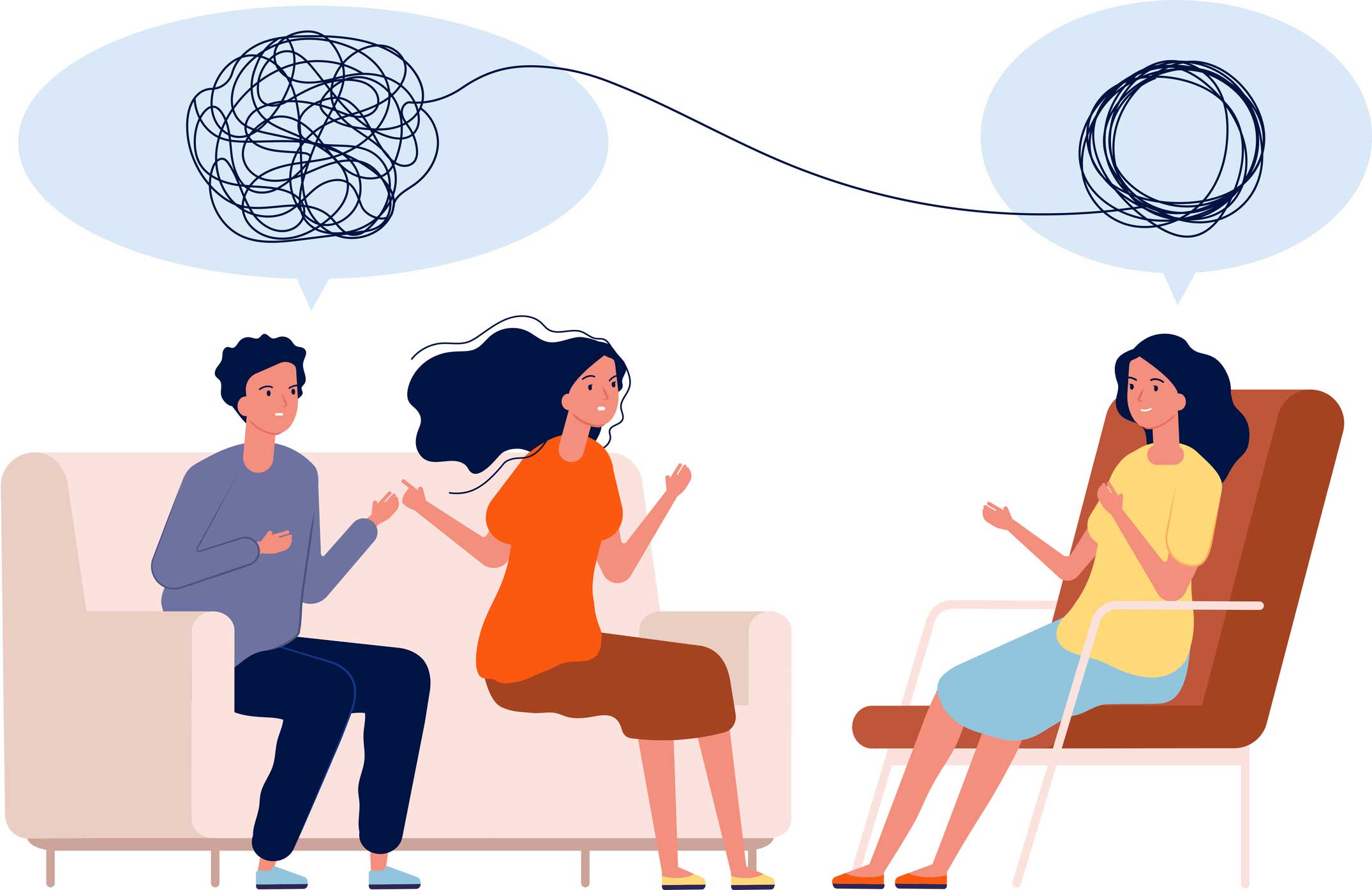Over the past two months, we’ve examined some key principles behind trauma-informed care for couples. Now it’s time to take a closer look at what these concepts look like in practice. We will explore a case brought to my training group by a seasoned therapist who has been trained in emotionally focused couples therapy and the Gottman method, as well as the Developmental Model. The couple she is treating offers us a chance to see the dynamics of trauma-informed care in action.
What we know from the beginning
The couple in this case present a complex set of issues. The female partner has a long history of difficulties with attachment. The male is grappling with severe past trauma.
Both want to avoid the fear and discomfort that comes up whenever they don’t agree, so they have developed the habit of avoiding conflict. However, thanks to the scripts that each learned growing up, they actually believe they are dealing with issues – simply because they fight. Nothing gets resolved and key issues are being buried, only to resurface later.
It is helpful at the outset for any therapist to:
- Recognize the role of the trauma configurational reflex, in which past hurts are governing what these partners are thinking, saying, and doing in the present.
- Be aware that sometimes it takes months to establish trust with both partners, a pace that might seem frustrating in any other situation, but is necessary since the couple’s trauma and attachment issues have gone unrecognized or supported for so long.
- Normalize a great deal of each partner’s past experiences and show compassion for their pain and grief while creating a safe space for more challenging work.
- Help partners see that the coping skills of the past will not serve them in the present. New capacities are needed in order for their relationship to grow.
- Be a strong leader in a complex situation and provide clear structure going into each session.
What it means to lead effectively
Leadership begins with achieving a delicate balance between the soft, empathic connection that builds trust, and the necessity for containment and structure that assures actual progress for the couple.
This balance is crucial, because even the most skilled therapist can be pulled into the couple’s patterns. Feeling hopeless or exhausted, dreading seeing the couple, or feeling you don’t know where to go next are all signs you’re being dragged into their difficulties. It’s time to regroup and move into a leadership role again, which means:
- Recognizing your own body triggers (such as fear, tension, or disgust) that indicate you’re drifting into their system.
- Giving yourself permission to take a moment and regroup, and actually signaling this to the couple. This models a positive habit for them, since it’s always good to pause and redirect when things become too confusing or heated.
- Remembering Viktor Frankl’s teaching that between stimulus and response, there is a space and in that space is our power to choose how we react.
Going into each session with a general goal in mind will help you stay on track. This doesn’t always mean the couple will get there, of course. It helps to keep some goals very broad: for example, building connections, teaching them something specific about developmental stages, or giving praise and credit for progress made.
The case at hand: how these principles play out in session
The couple in this case study have an unstable bond. It took them a long time to decide to get married, and since then, they have not made much progress toward the healthy differentiation that stabilizes relationships over the long term.
The therapist knows she must use praise and/or support for the partners by describing what she sees in detail. She might make some of these points:
You are in a place right now where you have some normal challenges going ahead. You’re trying to make major decisions together, and you may not agree which way to go at first. In order to get through these issues, you will both need to build some new skills.
You’ve already started to make progress together, and that is wonderful. You are learning how to address conflicts and differences without being afraid you will “break” the relationship.
Would it be all right if I challenge you when I see you slipping back into withdrawal or defensiveness when we talk about important issues? I’ll do my best to be descriptive and to do it in a way that doesn’t make you feel bad. All of us need a mirror to see ourselves more clearly.
This isn’t a race; we can take our time listening and learning from each other.
We’ll know we are making huge progress when you can feel upset when conflicts arise, but it doesn’t stop you from talking things through and finding a solution that feels pretty good to you both.
These points will help the couple buy into the process. They may be made and reinforced over several sessions, since trust can be very slow to build in those facing attachment and trauma issues.
Mapping this couple’s challenges
The goal with this couple is to focus on building developmental capacities, not exploring narrow issues. The therapist realizes that in this case:
- The wife has a fear of being stuck at home, living her life as “just a housewife.”
- Neither partner understands what it means to work as a team. They had no role models growing up, and they respond to conflict in different ways. For example, he tends to act tough and independent while she gets passive and withdrawn.
- Money and material possessions are an issue. They don't have a clear sense of what belongs to each partner and what they own together. He often gets belittling or degrading and says things to his partner such as, “It’s not your money and you can’t even support yourself, so I don’t have to run anything past you.” Even though he might believe he is confronting the issue of money, he is actually running from it by shutting down all dialogue with his wife and discounting their interdependency.
- He feels unappreciated and misunderstood, but he lacks the vocabulary to express his desire to be appreciated.
Working toward differentiation – and hope
This couple has so little tolerance for differences that they may decide early in the game that it’s no use trying. The therapist needs to acknowledge that virtually all couples fear facing their substantial differences. Disagreeing doesn’t mean the relationship is coming apart or that their attachment is severed; in fact, if they can learn to feel these emotions as they keep talking and negotiating, they will build strength together.
The therapist can focus on other-differentiation, where the partners are learning to listen to one another as separate people. Reinforcing that all people have different points of view and that their differences can evolve into strengths.
Partners will begin making real progress as the therapist moves them forward into discussions of how successful decisions can be made. Eventually, the idea that some decisions are equilateral while others are unilateral can come into play.
How much time should be devoted to past trauma?
When partners are playing out trauma histories together, you may wonder when to discuss past struggles and when to stay focused on changing the dynamic in the present. Keep in mind that the larger goal is to help each partner develop a strong sense of self where they are better able to manage their own triggers and support one another. In many cases, skill-building cannot proceed until the pain of the past has been explored and understood by both partners.
The interplay of past and present will present differently with every couple you encounter. Following your intuition, taking care not to fall into the couple’s unhealthy narratives and focusing on differentiation rather than narrow issue resolution will keep you on track.
Take Action Now
Question: What else would you like to learn about trauma and couples therapy? Please let me know in the comment section below. Are you interested in reading more about working with trauma in couples therapy?


 We respect your privacy.
We respect your privacy.




How to manage the case with 2 individual therapists are seeing the members of the couple. Specifically how to manage intrusions fr an individual therapist who colludes with the member and demands I provide a couples session so the member can talk to her partner.Also the problems that arise when working with an individual therapist who has a different orientation eg arts therapist vs LCSW would be helpful. I can provide examples .
I would like to know how much of the session to focus on the individual’s trauma vs. how it impacts the relationship vs. other issues they may be having that are not related to the trauma. With a typical hour per week session this feels very limited, when all of the above may be going on. I can see why therapists refer the traumatized individual to individual counseling with a different therapist, but I can also see the value of addressing that trauma in the couple’s session.
Thank you Ellyn, this trauma series is wonderful. It’s so important to remember that as couples therapists, we are uniquely positioned to help with trauma work, because couples recreate in real time their trauma histories in their relationships, and that makes it possible to intervene at the individually in the presence of the other. So powerful!